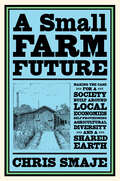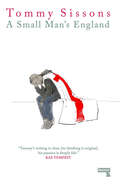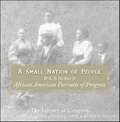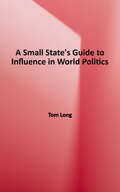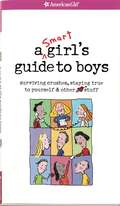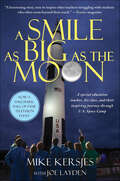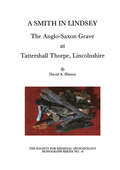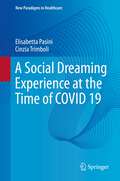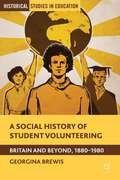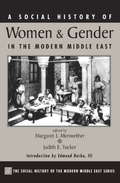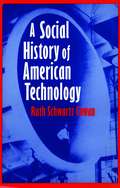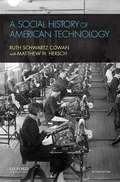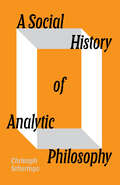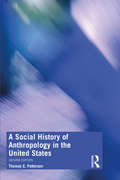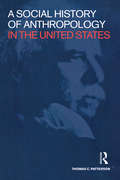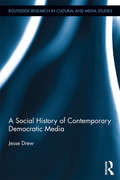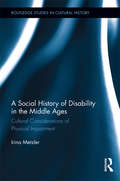- Table View
- List View
A Small Boy and Others: Imitation and Initiation in American Culture from Henry James to Andy Warhol
by Michael MoonIn A Small Boy and Others, Michael Moon makes a vital contributon to our understanding of the dynamics of sexuality and identity in modern American culture. He explores a wide array of literary, artistic, and theatrical performances ranging from the memoirs of Henry James and the dances of Vaslav Nijinsky to the Pop paintings of Andy Warhol and such films as Midnight Cowboy, Blue Velvet, and Jack Smith's Flaming Creatures.Moon illuminates the careers of James, Warhol, and others by examining the imaginative investments of their protogay childhoods in their work in ways that enable new, more complex cultural readings. He deftly engages notions of initiation and desire not within the traditional framework of "sexual orientation" but through the disorienting effects of imitation. Whether invoking the artist Joseph Cornell's early fascination with the Great Houdini or turning his attention to James's self-described "initiation into style" at the age of twelve--when he first encountered the homoerotic imagery in paintings by David, Géricault, and Girodet--Moon reveals how the works of these artists emerge from an engagement that is obsessive to the point of "queerness."Rich in historical detail and insistent in its melding of the recent with the remote, the literary with the visual, the popular with the elite, A Small Boy and Others presents a hitherto unimagined tradition of brave and outrageous queer invention. This long-awaited contribution from Moon will be welcomed by all those engaged in literary, cultural, and queer studies.
A Small Farm Future: Making the Case for a Society Built Around Local Economies, Self-Provisioning, Agricultural Diversity and a Shared Earth
by Chris SmajeIn a time of looming uncertainties, what would a truly resilient society look like? In a groundbreaking debut, farmer and social scientist Chris Smaje argues that organising society around small-scale farming offers the soundest, sanest and most reasonable response to climate change and other crises of civilisation—and will yield humanity’s best chance at survival. Drawing on a vast range of sources from across a multitude of disciplines, A Small Farm Future analyses the complex forces that make societal change inevitable; explains how low-carbon, locally self-reliant agrarian communities can empower us to successfully confront these changes head on; and explores the pathways for delivering this vision politically. Challenging both conventional wisdom and utopian blueprints, A Small Farm Future offers rigorous original analysis of wicked problems and hidden opportunities in a way that illuminates the path toward functional local economies, effective self-provisioning, agricultural diversity and a shared earth.
A Small Farm Future: Making the Case for a Society Built Around Local Economies, Self-Provisioning, Agricultural Diversity and a Shared Earth
by Chris SmajeA modern classic of the new agrarianism"Chris Smaje...shows that the choice is clear. Either we have a small farm future, or we face collapse and extinction."—Vandana Shiva"Every young person should read this book."—Richard HeinbergIn a groundbreaking debut, farmer and social scientist Chris Smaje argues that organizing society around small-scale farming offers the soundest, sanest and most reasonable response to climate change and other crises of civilisation—and will yield humanity&’s best chance at survival.Drawing on a vast range of sources from across a multitude of disciplines, A Small Farm Future analyses the complex forces that make societal change inevitable; explains how low-carbon, locally self-reliant agrarian communities can empower us to successfully confront these changes head on; and explores the pathways for delivering this vision politically.Challenging both conventional wisdom and utopian blueprints, A Small Farm Future offers rigorous original analysis of wicked problems and hidden opportunities in a way that illuminates the path toward functional local economies, effective self-provisioning, agricultural diversity and a shared earth.Perfect for readers of both Wendell Berry and Thomas Piketty, A Small Farm Future is a refreshing, new outlook on a way forward for society—and a vital resource for activists, students, policy makers, and anyone looking to enact change.
A Small Man's England
by Tommy SissonsAn exploration of white working-class English men, showing how and why some have been captured by the far-right and what the left can do about it.IS THE WHITE WORKING CLASS RIGHT-WING? AND IS IT RIGHT-WING TO EVEN SPEAK OF A "WHITE WORKING CLASS"? In recent decades, as class consciousness has been suppressed and eroded, many white working-class men have turned their backs on the left in favour of the right and the far-right. Why is this? A Small Man's England is a polemic aimed at the structures of hierarchy that ceaselessly maintain power across Britain and elsewhere, and a call for multicultural solidarity amongst the working class. In analysing the roles that class, race, masculinity and nationality play in neoliberal Britain, Sissons offers a solution to the indoctrination of white working-class English men by the right and the far-right, and explores how working-class people can collectively shape a "Common England" -- a country based on equality and justice for all.
A Small Nation of People: W. E. B. Du Bois and African American Portraits of Progress
by David Levering Lewis Deborah WillisAn incredible treasure trove of more than 150 illustrations detailing a small nation of African Americans prepared to make their mark on America
A Small State's Guide to Influence in World Politics
by Tom LongA complete guide for how small states can be strikingly successful and influential--if they assess their situations and adapt their strategies. Small states are crucial actors in world politics. Yet, they have been relegated to a second tier of International Relations scholarship. In A Small State's Guide to Influence in World Politics, Tom Long shows how small states can identify opportunities and shape effective strategies to achieve their foreign policy goals. To do so, Long puts small states' relationships at the center of his approach. Although small states are defined by their position as materially weaker actors vis-a-vis large states, Long argues that this condition does not condemn them to impotence or irrelevance. Drawing on typological theory, Long builds an explanation of when and how small states might achieve their goals. The book assesses a global range of cases successes and failures and offers a set of tools for scholars and policymakers to understand how varying international conditions shape small states' opportunities for influence.
A Small Town Love Story: Colonial Beach, Virginia
by Sherryl WoodsPart memoir, part oral history, #1 New York Times bestselling author Sherryl Woods gives us a rare and intimate look at Colonial Beach, Virginia.Rich in narrative history and local color, A Small Town Love Story: Colonial Beach, Virginia is an homage to the town of Sherryl Woods’s summers, a place that stole her heart long ago and provided the basis for the many fictional small towns in her bestselling novels.True to Woods’s signature style of focusing on characters who are at the center of their communities, here she has woven together the stories of the very real people who helped shape this seaside Virginia town. She takes us back to the days of her own family gatherings, artfully capturing the unique essence of Colonial Beach and making us yearn for small-town life.Woods’s own memories frame the true stories she features—from the unique history of Colonial Beach itself to some firsthand accounts of the Oyster Wars that once consumed the community, to the stories of neighborhood merchants who made it a point to know just about every customer by name. From farmers to restauranteurs and hoteliers, from pastors to librarians and military folk, Woods’s research and interviews give life to the personalities of a very special place.
A Smart Girl's Guide to Boys: Surviving Crushes, Staying True to Yourself and Other Stuff! (American Girl)
by Nancy HolyokeA preteen girl's guide to relationships with boys.
A Smart Girl's Guide to Manners: The Secrets to Grace, Confidence, and Being Your Best
by Nancy HolyokeWith this comprehensive manners guide, girls learn proper etiquette for everyday events and tricky social situations. The book is filled with great advice on everything from eating in fancy restaurants and handling troublemakers at parties to regaining composure after embarrassing accidents.
A Smarter Toronto: Some Reassembly Required
by Bob HankeThis book bridges media, technocultural, urban, and journalism studies to examine the role of journalism in relation to a smart city project on Toronto’s waterfront. From the announcement of the public-private partnership called Sidewalk Toronto to the project’s termination, a mediatized controversy unfolded. Through an assemblage approach to this project and a case study of The Globe and Mail and the Toronto Star, it follows the actors and chronicles the Quayside project story as a conversation about the promise and perils of a future “smart” neighbourhood. In the news of Waterfront Toronto, Sidewalk Labs, other actors, events, and developments, there were multiple voices and views, interpretations and arguments, that manifested conflicting interests and values. As a locally situated actor, journalism produced a porous discourse that expressed a proposeand- public pushback movement. This work of articulating mediation conditioned the project’s alteration and dissolution within asymmetrical relations of power. In addition to a wave of opposition that inflected the project’s enactment, a time lag between project time and governmental policymaking made the controversy over this future urban space intractable. With their residual symbolic power, quality journalism contributed to dialogical urban learning.
A Smile as Big as the Moon: A Special Education Teacher, His Class, and Their Inspiring Journey Through U.S. Space Camp
by Joe Layden Mike KersjesThe inspiring true story of how one special education teacher got his class to Space Camp—now a Hallmark Hall of Fame television event.“A heartening story, sure to inspire other teachers struggling with students who often seem beyond their reach.” —Teacher magazineMike Kersjes always believed that his students could do anything—even attend the prestigious Space Camp in Huntsville, Alabama, where some of America’s best and brightest high school students compete in a variety of activities similar to those experienced by NASA astronauts training for shuttle missions. The challenge was convincing everyone else that the kids in his special education class, with disabilities including Tourette’s syndrome, Down’s Syndrome, dyslexia, eating disorders, and a variety of emotional problems, would benefit from the experience and succeed. With remarkable persistence, Kersjes broke down one barrier after another, from his own principal’s office to the inner sanctum of NASA, until Space Camp finally opened its doors. After nine months of rigorous preparation, Kersjes’s class arrived at Space Camp, where they turned in a performance beyond everyone’s expectations.“A testament to how perseverance can get results and how children can perform surprising feats in a system that doesn’t always work to help children.” —Pittsburgh Post-Gazette“Kersjes’s refreshing, heart-warming account proves that faith and vision can yield great things.” —Publishers Weekly
A Smith in Lindsey: The Anglo-Saxon Grave at Tattershall Thorpe, Lincolnshire (The Society for Medieval Archaeology Monographs #16)
by David A. Hinton"Contents Include: An introduction to the grave, conservation, metallurgical and other analyses, a catalogue of organic and inorganic materials, and a discussion of dates and context."
A Social Critique of Corporate Reporting: A Semiotic Analysis of Corporate Financial and Environmental Reporting (Routledge Revivals)
by David CrowtherThis title was first published in 2002: This text is concerned with the role of corporate reporting in UK public limited companies. It is a common assumption that the most significant part of any corporate report is the accounting information contained within. This book, however, takes a different view. The central argument is that the purpose of corporate reporting has changed from one primarily of stewardship and accountability to shareholders to a more outward- and forward-looking perspective. The author argues that one of the driving forces for this change in orientation is the discourse of environmental accounting, along with other forces. The book is essentially explorative. The author is concerned with looking at different aspects of the changes in corporate reporting and taking different perspectives in the development of the argument.
A Social Dreaming Experience at the Time of COVID 19 (New Paradigms in Healthcare)
by Elisabetta Pasini Cinzia TrimboliThe book describes the experience of four Social Dreaming Matrices held online between March and May 2020, during the first lockdown caused by the Covid 19 emergency. The pandemic isolated us and imposed prolonged contact with ourselves and our solitary thoughts. Against this backdrop, there was hope for change, a desire for a different kind of sociability and different forms of intimacy. On the basis of this evidence, our research supports the shift "from experiencing trauma to reacting to trauma", looking at a collective traumatic experience not only as something to be overcome but as an opportunity for a transformation that changes our mental schemes in relation to the external context. We have identified Social Dreaming as a privileged technique to overcome a collective traumatic experience, supporting its elaboration through collective feelings, new connections between intuition and rational thought, the discovery of community meanings. The authors's thesis is that the much-needed transition from 'magical thinking' to 'transformative thinking' takes place in a setting that is able to contain the anxieties of life's transitional phases, supporting the creation of new rituals and new social bonds and sustaining the passage from “me” to a “wider we”.
A Social History Of Student Volunteering
by Georgina BrewisGeorgina Brewis takes a long view of the experience of going to university in Britain over a hundred year period. She explores students' extra-curricular volunteering, fundraising, campaigning and protest activities in Britain and beyond to show that voluntary action was central to the emergence of a distinct student movement. Brewis also considers the evolution of volunteering since the late nineteenth century through study of students' activities and argues that the universities made significant contributions to causes and campaigns ranging from educational reconstruction in 1920s Europe, relief for victims of fascism in the 1930s, and international development in the 1960s. The book draws on rich historical sources and a wider range of student testimony than any earlier study to tell the fascinating story of how ordinary women and men students engaged with the pressing social and international problems of the twentieth century.
A Social History Of Women And Gender In The Modern Middle East
by Margaret Lee Meriwether Judith TuckerIn this important new work, Margaret Meriwether and Judith Tucker synthesize and make accessible the results of the extensive research on women and gender done over the last twenty years. Using new theoretical approaches and methodologies as well as nontraditional sources, scholars studying women and gender issues in Middle Eastern societies have made great progress in shedding light on these complex subjects. A Social History of Women and Gender in the Modern Middle East provides an overview of this scholarship on women and gender in the nineteenth- and twentieth-century Middle East. The book is organized along thematic lines that reflect major focuses of research in this area--gender and work, gender and the state, gender and law, gender and religion, and feminist movements--and each chapter is written by a scholar who has done original research on the topic. Although structured around the individual author’s own work, the chapters also include overviews and assessments of other research, highlights of ongoing debates and key issues, and comparisons across regions of the Middle East. An insightful introduction centers the various chapters around key theoretical, methodological, and historical issues and makes connections with other areas of social historical research on the Middle East and with research on gender and women’s history in other parts of the world. Although there are many studies available on women and gender, A Social History of Women and Gender in the Modern Middle East provides a breadth of coverage and assessment of the field that is not found elsewhere.
A Social History of Administrative Science in Italy: Planning a State of Happiness from Liberalism to Fascism (Italian and Italian American Studies)
by Andrea RapiniThis book traces the origins, life and death of Administrative Science in Italy as an academic discipline between the nineteenth and twentieth centuries. It does so by combining the study of ideas, institutional history, intellectual history and social history. The Faculty of Law first introduced Administrative Science in 1875, with the aim of providing the elite with the necessary tools to distribute wealth more equally, to take care of the population and, thus, to make the young Italian State more legitimate in the eyes of the emerging masses. Law and social sciences were merged with the aim of increasing reforms, including that of creating a State of Happiness for all citizens. Throughout its 70-year existence, Administrative Science was deprived of its contents and scientific independence, and academically overshadowed by Administrative and Public law. Finally, although the liberal elites discarded the reformer project of Administrative Science even before Fascism turned everything upside down, most of the original traits of this knowledge were absorbed into Fascist corporate and totalitarian structures.
A Social History of American Technology
by Ruth Schwartz Cowan(back of book) For over 250 years American technology has been regarded as a unique hallmark of American culture and an important factor in American prosperity. Despite this, American history has rarely been told from the perspective of the history of technology. A Social History of American Technology fills this gap by surveying the history of American technology from the tools used by the earliest native inhabitants to the technological systems- cars and computers, aircraft and antibiotics- we are familiar with today. Cowan makes use of the most recent scholarship to explain how the unique characteristics of American cultures and American geography have affected the technologies that have been invented, manufactured, and used throughout the years. She also focuses on the key individuals and ideas that have shaped important technological developments. The text explains how various technologies have affected the ways in which Americans work, govern, cook, transport, communicate, maintain their health, and reproduce. Cowan demonstrates that technological change has always been closely related to social development, and explores the multiple, complex relationships that have existed between such diverse social agents as households and businesses, the scientific community and the defense establishment, artists and inventors. Divided into three sections- colonial America. industrialization, the 20th century- A Social History of American Technology is ideal for courses in American social and economic history, as a correlated text for the American history survey, as well as for courses that focus on the history of technology. It offers students the unique opportunity to learn not only how profoundly technological change has affected the American way of life, but how profoundly the American way of life has affected technology.
A Social History of American Technology (Second Edition)
by Ruth Schwartz Cowan Matthew H. HerschA Social History of American Technology, Second Edition, tells the story of American technology from the tools used by its earliest inhabitants to the technological systems - cars and computers, aircraft and antibiotics - that we are familiar with today. Ruth Schwartz Cowan and Matthew H. Hersch demonstrate how technological change has always been closely related to social and economic development, and examine the important mutual relationships between social history and technological change. They explain how the unique characteristics of American cultures and American geography haveaffected the technologies that have been invented, manufactured, and used throughout the years - and also the reverse: how those technologies have affected the daily lives, the unique cultures, and the environments of all Americans.
A Social History of Analytic Philosophy
by Christoph SchuringaHow a supposedly apolitical form of philosophy owes its continuing power to social and political forcesAnalytic philosophy is the leading form of philosophy in the English-speaking world. What explains its continued success? Christoph Schuringa argues that its enduring power can only be understood by examining its social history. Analytic philosophy tends to think of itself as concerned with eternal questions, transcending the changing scenes of history. It thinks of itself as apolitical. This book, however, convincingly shows that the opposite is true.The origins of analytic philosophy are in a set of distinct movements, shaped by high-ly specific sets of political and social forces. Only after the Second World War were these disparate, often dynamic movements joined together to make &‘analytic philosophy&’ as we know it. In the climate of McCarthyism, analytic philosophy was robbed of political force.To this day, analytic philosophy is the ideology of the status quo. It may seem arcane and largely removed from the real world, but it is a crucial component in upholding liberalism, through its central role in elite educational institutions. As Schuringa concludes, the apparently increasing friendliness of analytic philosophers to rival approaches in philosophy should be understood as a form of colonization; thanks to its hegemonic status, it reformats all it touches in service of its own imperatives, going so far as to colonize decolonial efforts in the discipline.
A Social History of Anthropology in the United States
by Thomas C. PattersonThis book offers a comprehensive introduction to the social history of anthropology in the United States, examining the circumstances that gave rise to the discipline and illuminating the role of anthropology in the modern world. Thomas C. Patterson considers the shifting social and political-economic conditions in which anthropological knowledge has been produced and deployed, the appearance of practices focused on particular regions or groups, the place of anthropology in structures of power, and the role of the educator in forging, perpetuating, and changing representations of past and contemporary peoples. The book addresses the negative reputation that anthropology took on as an offspring of imperialism, and provides fascinating insight into the social history of America. In this second edition, the material has been revised and updated, including a new chapter that covers anthropological theory and practice during the turmoil created by multiple ongoing crises at the beginning of the twenty-first century. This is valuable reading for students and scholars interested in the origins, development, and theory of anthropology.
A Social History of Anthropology in the United States: Second Edition
by Thomas C. PattersonIn part due to the recent Yanomami controversy, which has rocked anthropology to its very core, there is renewed interest in the discipline's history and intellectual roots, especially amongst anthropologists themselves. The cutting edge of anthropological research today is a product of earlier questions and answers, previous ambitions, preoccupations and adventures, stretching back one hundred years or more. This book is the first comprehensive history of American anthropology. Crucially, Patterson relates the development of anthropology in the United States to wider historical currents in society. American anthropologists over the years have worked through shifting social and economic conditions, changes in institutional organization, developing class structures, world politics, and conflicts both at home and abroad. How has anthropology been linked to colonial, commercial and territorial expansion in the States? How have the changing forms of race, power, ethnic identity and politics shaped the questions anthropologists ask, both past and present? Anthropology as a discipline has always developed in a close relationship with other social sciences, but this relationship has rarely been scrutinized. This book details and explains the complex interplay of forces and conditions that have made anthropology in America what it is today. Furthermore, it explores how anthropologists themselves have contributed and propagated powerful images and ideas about the different cultures and societies that make up our world. This book will be essential reading for anyone interested in understanding the roots and reasons behind American anthropology at the turn of the twenty-first century. Intellectual historians, social scientists, and anyone intrigued by the growth and development of institutional politics and practices should read this book.
A Social History of Contemporary Democratic Media (Routledge Research in Cultural and Media Studies)
by Jesse DrewThe last few decades have helped dispel the myth that media should remain driven by high-end professionals and market share. This book puts forward the concept of "communications from below" in contrast to the "globalization from above" that characterizes many new developments in international organization and media practices. By examining the social and technological roots that influence current media evolution, Drew allows readers to understand not only the Youtubes and Facebooks of today, but to anticipate the trajectory of the technologies to come. Beginning with a look at the inherent weaknesses of the U.S. broadcasting model of mass media, Drew outlines the early 1960s and 1970s experiments in grassroots media, where artists and activists began to re-engineer electronic technologies to target local communities and underserved audiences. From these local projects emerged national and international communications projects, creating production models, social networks and citizen expectations that would challenge traditional means of electronic media and cultural production. Drew’s perspective puts the social and cultural use of the user at the center, not the particular media form. Thus the structure of the book focuses on the local, the national, and the global desire for communications, regardless of the means.
A Social History of Disability in the Middle Ages: Cultural Considerations of Physical Impairment (Routledge Studies in Cultural History #14)
by Irina MetzlerWhat was it like to be disabled in the Middle Ages? How did people become disabled? Did welfare support exist? This book discusses social and cultural factors affecting the lives of medieval crippled, deaf, mute and blind people, those nowadays collectively called "disabled." Although the word did not exist then, many of the experiences disabled people might have today can already be traced back to medieval social institutions and cultural attitudes. This volume informs our knowledge of the topic by investigating the impact medieval laws had on the social position of disabled people, and conversely, how people might become disabled through judicial actions; ideas of work and how work could both cause disability through industrial accidents but also provide continued ability to earn a living through occupational support networks; the disabling effects of old age and associated physical deteriorations; and the changing nature of attitudes towards welfare provision for the disabled and the ambivalent role of medieval institutions and charity in the support and care of disabled people.
A Social History of English Rugby Union
by Tony CollinsFrom the myth of William Webb Ellis to the glory of the 2003 World Cup win, this book explores the social history of rugby union in England. Ever since Tom Brown’s Schooldays the sport has seen itself as the guardian of traditional English middle-class values. In this fascinating new history, leading rugby historian Tony Collins demonstrates how these values have shaped the English game, from the public schools to mass spectator sport, from strict amateurism to global professionalism. Based on unprecedented access to the official archives of the Rugby Football Union, and drawing on an impressive array of sources from club minutes to personal memoirs and contemporary literature, the book explores in vivid detail the key events, personalities and players that have made English rugby. From an era of rapid growth at the end of the nineteenth century, through the terrible losses suffered during the First World War and the subsequent ‘rush to rugby’ in the public and grammar schools, and into the periods of disorientation and commercialisation in the 1960s through to the present day, the story of English rugby union is also the story of the making of modern England. Like all the very best writers on sport, Tony Collins uses sport as a prism through which to better understand both culture and society. A ground-breaking work of both social history and sport history, A Social History of English Rugby Union tells a fascinating story of sporting endeavour, masculine identity, imperial ideology, social consciousness and the nature of Englishness.

